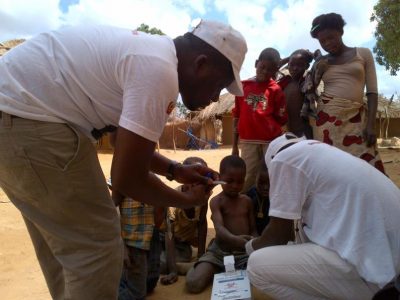In 2013, with PMI’s support, the NMCP launched a universal mosquito net distribution campaign in six districts of Nampula Province, in the northern region of the country.

In Mozambique, a PMI-supported FELTP fellow conducts a rapid diagnostic test to evaluate the impact of a mosquito net campaign on malaria transmission. Source: Mateusz Plucinski/CDC
To evaluate the impact of the campaign on malaria transmission, PMI, with the support of a CDC Epidemic Intelligence (EIS) Officer and a fellow in the Mozambique Field Epidemiology and Laboratory Training Program (FELTP)1, developed an evaluation protocol. During the evaluation, randomly-selected households in two of the target districts were visited within two weeks following the mosquito net distribution campaign. Four FELTP residents, all Mozambican epidemiologists-in-training, each led a survey team. Teams worked long days in the field, visiting up to nine houses per day during the peak of the hot, dry season. At each household, a brief questionnaire was administered in the local language, the placement and condition of mosquito nets was visually inspected, household members were tested for malaria and treatment was provided to those residents who tested positive. In one year, the districts will be revisited to assess whether greater access to mosquito nets has changed malaria prevalence in the area, as well as to assess the condition and use of nets distributed during the 2013 campaign.
It was a win/win all around with the NMCP, FELTP, and EIS field team working jointly to successfully implement the evaluation. The study provided in-country FELTP residents with an opportunity to build their capacity and gain field experience while applying their skills as epidemiologists and working alongside an EIS Officer and the NMCP.
1 The Field Epidemiology and Laboratory Training Program (FELTP) is a CDC training program that builds the capacity of in-country ministry of health staff to collect, analyze, and interpret data for decision making and conduct epidemiologic investigations. To date, PMI has supported approximately 70 trainees in 12 PMI focus countries in Africa (Angola, DRC, Ethiopia, Ghana, Kenya, Mozambique, Nigeria, Rwanda, Tanzania, Uganda, Zambia and Zimbabwe) and in the Greater Mekong Subregion (Burma).
